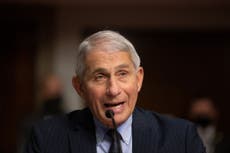Judge rejects Trump plan to end food stamps for 700,000 unemployed Americans
Mmeasure was first of three intended to restrict federal food safety net

A federal judge on Sunday formally struck down a Trump administration attempt to end food stamp benefits for nearly 700,000 unemployed people, blocking as "arbitrary and capricious" the first of three such planned measures to restrict the federal food safety net.
In a 67-page opinion, Chief US District Judge Beryl Howell of the District of Columbia condemned the Agriculture Department for not justifying or even addressing the impact of the sweeping change on states, saying its shortcomings had been placed in stark relief amid the coronavirus pandemic, during which unemployment has quadrupled and rosters of the Supplemental Nutrition Assistance Program have grown by more than 17 per cent with more than six million new enrolees.
The rule "at issue in this litigation radically and abruptly alters decades of regulatory practice, leaving States scrambling and exponentially increasing food insecurity for tens of thousands of Americans," Howell wrote, adding that the Agriculture Department "has been icily silent about how many [adults] would have been denied SNAP benefits had the changes sought . . . been in effect while the pandemic rapidly spread across the country."
The judge concluded that the department's "utter failure to address the issue renders the agency action arbitrary and capricious."
Howell's ruling granted summary judgment to a coalition of 19 states along with DC, New York City and private groups who sued to stop the new rule, finalised in December, to eliminate states' discretion to waive work requirements in distressed economic areas.
Howell temporarily enjoined the proposal 13 March, the same day President Donald Trump declared the coronavirus outbreak a national emergency. Congress then waived the requirement for the duration of the emergency as part of economic relief legislation, and the Trump administration suspended its planned April implementation date.
However, the Agriculture Department appealed the judge's earlier order, and absent court intervention the rule would take full effect at the end of the state of emergency. Spokesmen for the department did not immediately respond to a request for comment.
In a statement, New York Attorney General Letitia James called the decision "a win for common sense and basic human decency," adding that "If implemented, this rule would have not only made it harder for thousands to feed their families and risk them going hungry, but would have exacerbated the public health crisis we face and the economic recession we are still in the midst of under President Trump'."
Attorneys general from D.C., Maryland, Virginia, New York, California and other states alleged that the change, to slash nearly $5.5bn (£4.2bn) from food stamp spending over five years, would require "drastic cuts" for adults without children, ignored local labour market conditions, and was based on no evidence.
States are in the best position to evaluate local economic circumstances and the effectiveness of work requirements, they argued, warning against the elimination of "essential food assistance for benefits recipients who live in areas with insufficient jobs."
Able-bodied adults without dependents, between the ages of 18 and 49, can receive benefits for a maximum of three months during a three-year period, unless they are working or enrolled in an education or training program for 80 hours a month.
States have been able to waive this time limit to ensure access to food stamps during the ups and downs of reentering the workforce. Before this rule, counties with an unemployment rate as low as 2.5 per cent were included in waived areas.
The new rule would have tightened the criteria for states applying for such waivers, making six per cent the minimum unemployment rate for a county to receive a waiver.
In announcing the change last year, US Agriculture Secretary Sonny Perdue said: "This is about restoring the original intent of food stamps . . . moving more able-bodied Americans to self sufficiency."
Perdue cited the economic expansion as a basis for tightening states' waivers. He said the number of Americans receiving benefits under SNAP has grown from 17 million to more than 36 million since 2000, although the unemployment rate was lower at the time.
Two other proposed rule changes, not yet final, aim to cap deductions for utility allowance and to limit access to SNAP for working poor families.
A study by the Urban Institute shows the combined impact of these rules would cut 3.7 million people from SNAP in an average month. Benefits would be reduced for millions more, and 982,000 students would lose automatic access to free or reduced-price school meals.
The Washington Post
Join our commenting forum
Join thought-provoking conversations, follow other Independent readers and see their replies
Comments



Bookmark popover
Removed from bookmarks